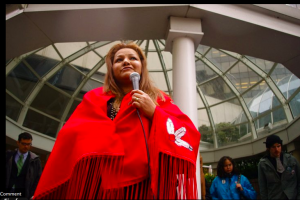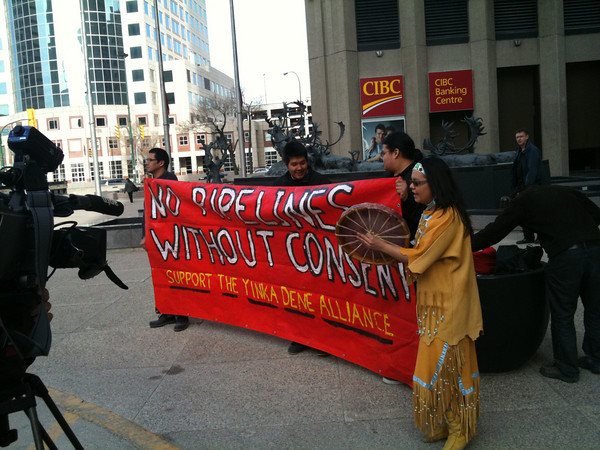
As Canadians were casting their votes in the Federal Election, another important decision was playing out in the board rooms of Canada’s top banks: what to do with Enbridge, sponsor of the Northern Gateway Pipeline.
Over the last several weeks, RAN teamed up with First Nations of the Yinka Dene Alliance to put senior banking executives on notice as they gathered for this season’s round of annual shareholder meetings. The message? First Nations are rights-holders, not stakeholders.
Here’s how they reacted (each bank’s name is followed by the total amount of funds raised for Enbridge since 2007):
- Bank of Montreal: $286 million
Geraldine Thomas-Flurer, Ann Ketlo and Jasmine Thomas of the Yinka Dene Alliance pressed CEO Bill Downe to dump Enbridge and update long-outdated policies on human rights and the environment. Downe invited them to a meeting to discuss community concerns. More than 50 supporters rallied outside.
- Toronto Dominion: $5 billion
CEO Edmond Clark accepted the invitation of Chief Jackie Thomas of Saik’uz First Nation to visit her community. He also pledged to to uphold the bank’s recognition of Indigenous Rights based on Free Prior Informed Consent. (See this video of the exchange, starts at 64:32.)
- Scotiabank: $10 billion (!)
No comment from CEO Rick Waugh after a moving speech by Jasmine Thomas, a youth representing the Yinka Dene Alliance. (Listen to her presentation at this link, starts at 1:58:20). Scotia’s written response to the Alliance was equally vague.
- CIBC: $220 million

Unlike the other banks, CIBC hasn’t responded to a letter from Chiefs of the Yinka Dene Member Nations raising concerns about Enbridge. This despite (or maybe because of) Enbridge CEO Patrick Daniel’s position on the bank’s Board. After Jasmine’s remarks, Board Chair Charles Sirois also failed to say anything of substance (catch the meeting here).
RBC has also been a big fundraiser for Enbridge (as in $1.5 billion raised since 2007), but didn’t get a visit from the Yinka Dene Alliance or RAN. We opted out this year as a sign of good faith in RBC’s new policy announced in December. The policy ostensibly requires the bank to consider whether clients obtain free, prior, informed consent (FPIC) of Indigenous communities impacted by client activities. How this policy will apply to Enbridge remains to be seen.
Learn more about why FPIC is important here.
Learn more about the Yinka Dene Alliance here.